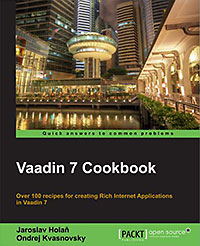At the end of April, we were happy to hear that a third book on Vaadin has been finalized and published (not counting Book of Vaadin, of course). The authors Jaroslav Holaň and Ondřej Kvasnovský have done an awesome job with the Vaadin 7 Cookbook.
“Cookbook” is indeed the perfect word to describe this book. It is divided into 12 chapters, each with its own theme (think “Starters”, “Meat”, “Fish”, ...). It contains a lot of small things that could be useful in an application, and then the ways and detailed steps to get there - the recipe itself. As the book contains a lot of code, and explanations for them, it’s very convenient that you can download all code from the book’s webpage. Having the code locally to tinker with is invaluable, and you get to avoid problems like copying things wrong by hand.
In addition to aiding the reader on using features that come with the framework itself, the book also dives into various technologies surrounding Vaadin and Java. Many examples use add-ons from Vaadin Directory, and using Vaadin with technologies like Grails is also covered.
If I would be a beginner with Vaadin, this is the kind of book I’d like to study - a lot of examples that do a single thing, and everything regarding to that one thing is well explained. With the example code downloaded and in my IDE, I’d be free to tinker around, and learn in the process - that’s how I learn new things, not by reading theoretical ramblings regarding things and stuff.
Check out Packt publishing’s website for this book to get a sneak peek into this book, and also links to various online retailers to get your hands on this. The book is available in both physical and ebook forms.
